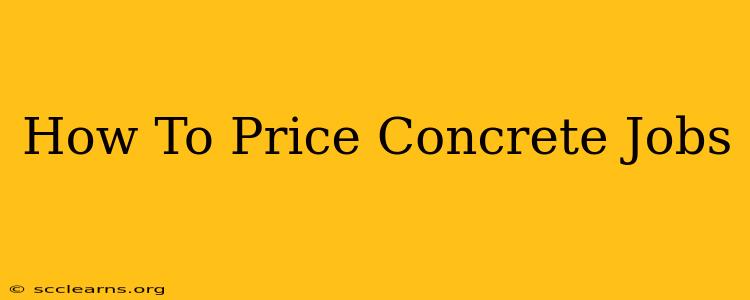Pricing concrete jobs accurately is crucial for the success of any concrete contractor. Undercharging can lead to financial losses, while overcharging can drive away potential clients. This guide provides a step-by-step approach to help you confidently and profitably price your concrete services.
Understanding Your Costs: The Foundation of Accurate Pricing
Before you even think about quoting a client, you need a solid grasp of your costs. This isn't just about the price of the concrete itself; it encompasses all aspects of the job. Let's break it down:
1. Material Costs:
- Concrete: This is your largest expense. Factor in the cubic yards needed (precise calculations are vital!), the type of mix (strength requirements vary greatly), and the delivery cost. Always get multiple quotes from concrete suppliers to secure the best price.
- Reinforcement: Rebar, mesh, or other reinforcement materials add to your expenses. Account for the quantity and type needed.
- Formwork: The lumber, plywood, and other materials used to shape the concrete are significant costs, especially for intricate projects.
- Admixtures: These chemical additives can improve concrete properties. Factor them in if required.
- Other Materials: This includes things like sealants, finishing tools, and any other materials specific to the project.
2. Labor Costs:
- Direct Labor: Calculate the hours required for each phase: excavation, formwork construction, concrete pouring, finishing, and cleanup. Pay close attention to labor rates in your area.
- Indirect Labor: Account for the time spent on project management, estimating, travel, and administration.
3. Equipment Costs:
- Rental Costs: If you rent equipment like mixers, vibrators, or compactors, factor in the rental fees.
- Fuel Costs: Account for fuel consumption for your equipment and vehicles.
- Maintenance Costs: Factor in routine maintenance and potential repairs.
4. Overhead Costs:
- Insurance: Liability and workers' compensation insurance are crucial.
- Vehicle Costs: Include costs associated with your trucks and vehicles.
- Office Expenses: Account for rent, utilities, and administrative costs.
- Marketing and Advertising: The costs of attracting new clients.
Calculating Your Markup: Turning Costs into Profit
Once you've totaled your costs, you need to add a markup to generate profit. This markup covers your overhead, profit margin, and unforeseen expenses.
-
Estimating Your Markup: A common markup is between 15% and 30%, but this can vary depending on the complexity of the job, competition, and your desired profit margin. Consider offering tiered pricing for larger projects.
-
Factors Affecting Markup: High-risk projects, specialized skills, and tight deadlines often justify higher markups.
Pricing Strategies for Concrete Jobs
Several effective pricing strategies can be implemented:
- Hourly Rate: Charge an hourly rate plus materials. This works well for smaller, less predictable jobs.
- Square Footage: Calculate a price per square foot. This is useful for larger, more uniform projects like patios or driveways.
- Cubic Yard Pricing: This is ideal for jobs where the concrete volume is the primary factor, such as foundations or large slabs.
- Fixed Price Contract: A detailed agreement specifies the exact cost, scope of work, and payment schedule. This method reduces disputes but requires thorough planning and accurate estimating.
Don't Forget the Fine Print!
Always include in your quotes:
- Detailed Scope of Work: Clearly define the services included.
- Payment Terms: Specify payment schedules and methods.
- Warranty Information: Outline any warranties on materials or workmanship.
- Liability Clause: Protect yourself from potential legal issues.
Refining Your Pricing: Experience and Iteration
Pricing concrete jobs accurately is a skill honed through experience. Track your actual costs on completed projects, and compare them to your estimates. This feedback loop will allow you to refine your pricing model over time, ensuring profitability and long-term success. Continuously research market rates and adjust your pricing as necessary to stay competitive.
By following these steps, you can develop a robust pricing strategy that ensures your concrete business thrives. Remember, accurate pricing isn't just about making a profit; it's about building a sustainable and reputable business.

